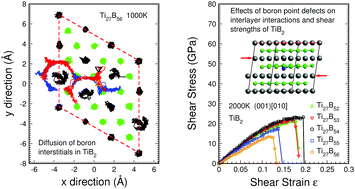Effects of boron defects on mechanical strengths of TiB2 at high temperature: ab initio molecular dynamics studies
Abstract
We report the determination of diffusion paths and potential barriers of boron point defects in TiB2 calculated using the climbing image nudged elastic band method at T = 0 K, and ab initio molecular dynamics studies on the structural stabilities, diffusion behavior of boron point defects and mechanical strengths of TiB2 at elevated temperatures. In contrast to the previous conjecture that TiB2 with boron vacancies are thermodynamically unstable based on the calculations at T = 0 K that boron vacancies have positive formation energies and shift electronic Fermi energies from the pseudogap valleys to the bonding states, our results show that boron vacancies in TiB2 are very robust and they have negligible effects on the structural stabilities and mechanical strengths of TiB2 at least up to 2000 K within the vacancy concentration we studied (<2.5 at%). On the other hand, our results reveal that the boron interstitials can diffuse easily in TiB2 at a moderately high temperature (1000 K) or under large shear and tensile deformations, which give rise to significant deteriorations (more than 50% reduction) in the mechanical strength of TiB2 at a high temperature (2000 K) with a boron interstitial density below 2.5 at%. Under all the shear and tensile deformations we applied, the boron interstitials in TiB2 eventually diffuse into the boron layers, causing deformations of these boron layers, which weakens their interactions with metal layers nearby and consequently reduces the mechanical strengths of the materials as temperature and boron interstitial density increase. The present findings expand our understandings on the material strength of TiB2 at high temperatures with boron point defects, and offer new insights for its applications as a high-strength ultra-high temperature ceramic.



 Please wait while we load your content...
Please wait while we load your content...